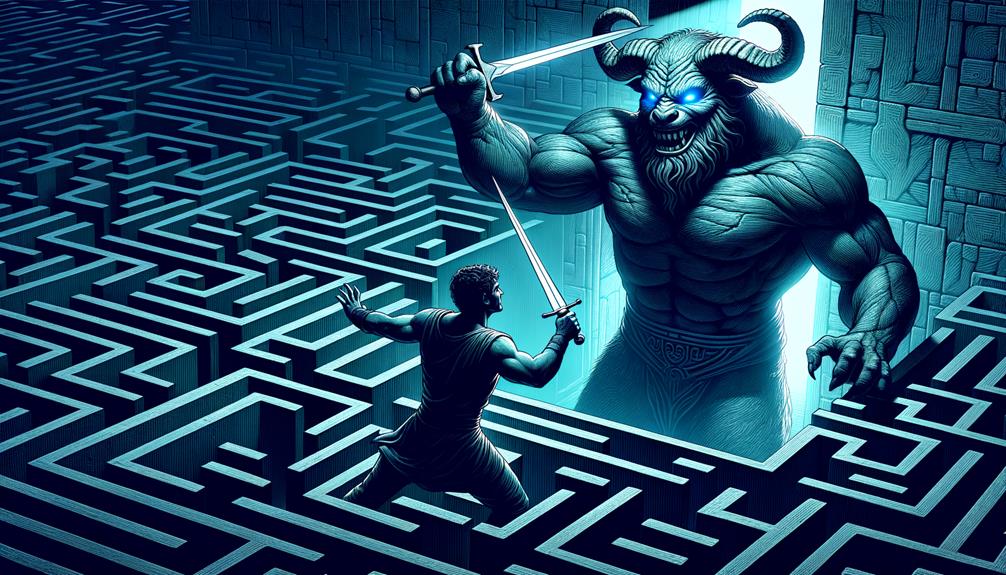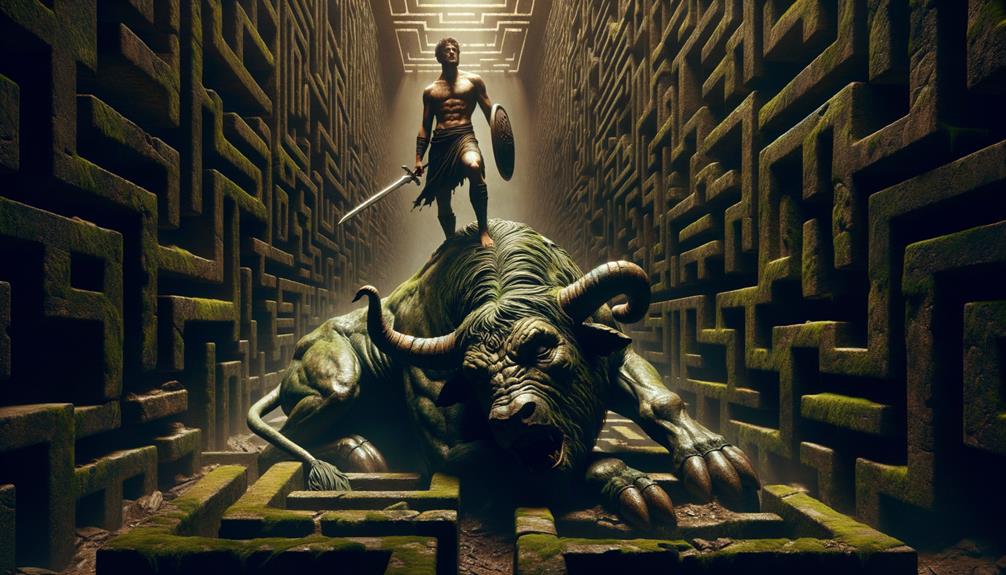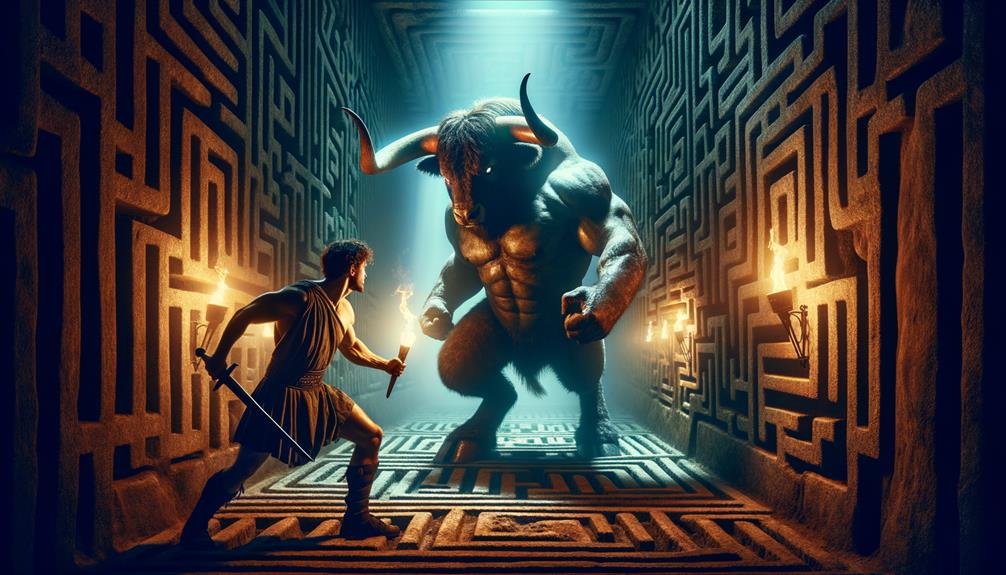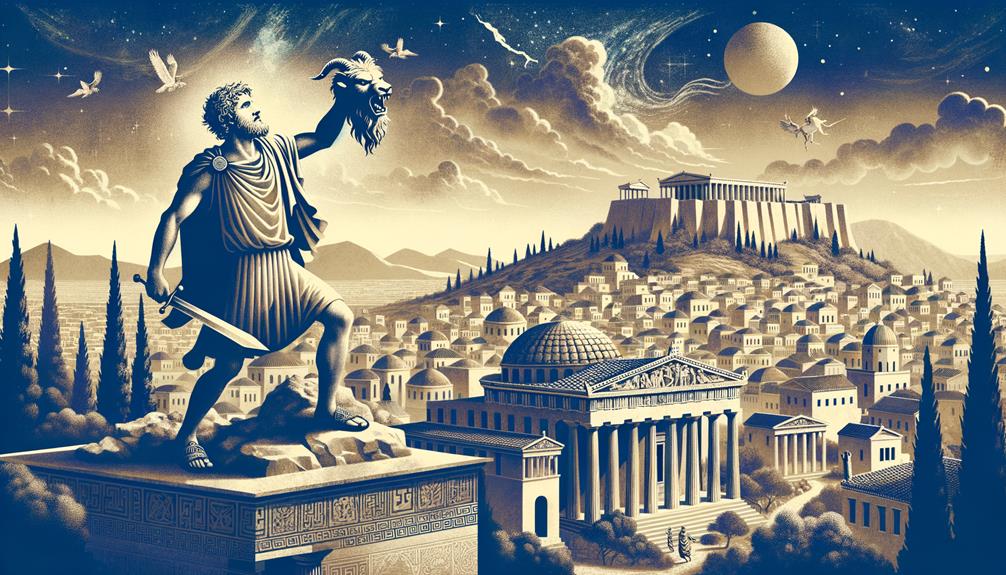Let's venture together into the captivating realm of ancient Greek mythology. Today, we focus on Theseus, the *cunning slayer of the Minotaur*. This tale, brimming with timeless wisdom, continues to echo through the centuries, underscoring the enduring relevance of our shared human experience.
In this narrative, Theseus is a figure of duality. He is both a beacon of strength and courage, and a symbol of personal failings. His triumph over the Minotaur in the dreaded labyrinth of King Minos showcases his unwavering resolve and heroic might, a testament to the power of determination in overcoming adversity. Yet, his betrayal of Ariadne serves as a stark reminder of how individual glory can sometimes overshadow our connections with others.
The story of Theseus is more than a heroic saga; it is a mirror reflecting our own triumphs and defeats, our strengths and weaknesses. By delving into the layers of this myth, we can extract valuable insights that resonate with our own experiences.
So, come along! As we navigate the twists and turns of this ancient tale, who knows what gems of wisdom await us in the labyrinth of this age-old narrative?
Remember, the power of mythology lies not merely in the stories themselves, but in their ability to illuminate the complexities of the human condition. Theseus, the Greek Minotaur conqueror, is a prime example. His tale is not just an exciting adventure, but a profound exploration of the dichotomies within us all.
Let's embark on this journey of discovery together, and let the tale of Theseus guide us in understanding not just the heroics of ancient Greece, but also the timeless lessons that continue to shape our modern lives. With each step, we'll unravel the depth of this myth, revealing truths about our own humanity.
Theseus: The Greek Hero

Theseus: The Greek Hero Beyond Mythology
Exploring ancient Greece's mythological landscape, we stumble upon Theseus, the mortal offspring of Poseidon and Aethra. This enigmatic figure strides out of legend, not only as a hero but also as a character embroiled in a whirlpool of ambition and controversy.
Theseus: The Audacious Adventurer
Theseus, the proud son of Athens' King Aegeus, embarked on a daring adventure to Crete. His mission? To eradicate the Minotaur, a fearsome beast confined within a complex labyrinth by King Minos. More than a mere monster, the Minotaur symbolized Athens' subservience to Crete, a tribute the city was forced to pay.
Armed with a thread given by Princess Ariadne, Theseus navigated the maze and crushed the Minotaur, emerging victorious from the labyrinth. This audacious act solidified his heroic status.
The Complex Legacy of Theseus
Yet, Theseus' heroism is marred by his abandonment of Ariadne during his return journey across the Aegean Sea. Despite her invaluable aid, he left her behind, returning to Athens hailed as a hero. His complex legacy is thus a testament to the multifaceted narratives that surround heroes in Greek mythology.
Unraveling the Hero's Journey
Imagine Theseus as a modern-day adventurer, stepping into a maze like the Escape Room challenge. With the help of a GPS (our Ariadne's thread), he deciphers the clues, overcomes the monster, and escapes the room, proving his mettle. But can he still be called a hero if he discards the GPS on his way out, forgetting to acknowledge its assistance?
In the same vein, Theseus' story is a reminder to honor those who aid us in our quests. His tale is not just an exciting adventure but an important lesson in gratitude and recognition, making these ancient Greek myths still relevant today.
Closing Thoughts
Theseus' tale, complex and controversial, underscores the richness of Greek mythology. His story, far from being a simple heroic saga, is a nuanced narrative that continues to engage and provoke thought. A mortal with godly lineage, a hero with a tainted legacy – Theseus remains a compelling figure in the pantheon of Greek mythology.
The Enigmatic Minotaur

Unraveling the Mysteries of the Minotaur
While the tale of Theseus never ceases to captivate us, we can't overlook the mesmerizing mystique of the Minotaur. This creature, a symbol of overwhelming power and dread, completes the narrative. The Minotaur, a half-man, half-bull entity, emerged from the unholy union of King Minos of Crete's wife and a celestial bull.
- The Minotaur's figure, a man's body topped with a bull's head, encapsulates an ungodly terror. Its grotesque form served as a chilling testament to Crete's ruthless oppression.
- Imprisoned in a convoluted labyrinth, King Minos exploited the Minotaur's menacing presence. His rule demanded human sacrifices from Athens at regular intervals, instilling a reign of fear.
- The legend where Theseus vanquishes the Minotaur symbolizes the victory of order over disorder, logic over barbarity.
With the guidance of Ariadne, King Minos's daughter, Theseus was able to eliminate the Minotaur and navigate his way out of the maze. The tale of Theseus and Ariadne adds a romantic element to the myth, but also exposes the human propensity for deceit, as Theseus eventually deserts Ariadne.
The Complex Layers of Human Nature and Mythical Symbolism
This intricate narrative serves as a stark reminder of the multifaceted aspects of human nature and the sophisticated symbolism embedded in myths.
By delving into this captivating myth, we gain insights into the complexities of human nature and the power of symbolism. As we navigate through the labyrinth of these stories, we are not just entertained, but also enlightened.
In Conclusion
The tale of the Minotaur serves as a testament to the power of myth and symbolism. It's more than just a story; it's a mirror reflecting the depths of human nature, the struggle for power, and the triumph of reason over chaos. So, next time you hear of Theseus, remember also the enigmatic Minotaur and the layers of meaning its existence adds to the narrative.
These stories serve as a reminder that while we may fear the unknown, it is often in confronting these fears that we find our greatest strengths.
The Labyrinth: A Maze of Terror

Welcome to the Heart of Crete: The Labyrinth
Right in the center of Crete, the Labyrinth stands tall. This complex architectural masterpiece was conceived by Daedalus, serving as a confinement for the fearsome Minotaur. Envision a creature with the head of a bull and the body of a man, instilling terror and panic with every step it took. This nightmarish figure is an essential element of the Minotaur legend.
The Labyrinth: More than Just a Prison
The Labyrinth wasn't simply a place of confinement; it was a deadly snare. It ensnared the guiltless young people of Athens, delivered as a chilling tribute to the Minotaur. In this scenario, the tale of Theseus begins to unfold. Theseus, with his heart filled with bravery and resolve, dared to plunge into the maze, vowing to dismantle the Minotaur's reign of terror.
The Unraveling of the Labyrinth's Secrets
Thanks to Ariadne, Theseus was able to decipher the maze's mysteries. A humble spool of thread served as his guide, enabling him to retrace his steps. He successfully vanquished the Minotaur, transforming the labyrinth from a symbol of terror to one of overcoming fear. His victory over the horrific beast on the island of Crete spotlighted his valor, etching Theseus' name forever in the annals of Greek mythology.
The Triumph of Theseus: A Symbol of Conquered Fear
Theseus' triumph, as he navigated the labyrinth's intricate paths and slew the Minotaur, serves as an enduring symbol of fear conquered. His story, a testament to courage and determination, resonates today as a beacon of hope and resilience against daunting challenges. The labyrinth, once a place of dread, transformed into a symbol of victory, a testament to the power of human resilience, and a beacon of hope for those facing their own 'labyrinths'.
In Conclusion: The Labyrinth's Legacy
The Labyrinth, once a terrifying maze, is now remembered as a symbol of triumph over fear. A testament to human courage, it's a stark reminder that with determination, any labyrinth in life can be navigated. So remember, no matter what maze you find yourself in, there's always a thread of hope waiting to guide you out!
The Dramatic Confrontation

The Epic Showdown: Theseus versus the Minotaur
We're diving into the heart-stopping climax of the legendary tale where Theseus, a young hero armed with just a thread and a club, sets out on his audacious quest to defeat the Minotaur. The saga of Theseus unfolds as he ventures into the intricate Labyrinth within King Minos' palace, guided by a thread bestowed upon him by Princess Ariadne.
- Confrontation in the Labyrinth: Theseus encounters the daunting Minotaur, a grotesque creature that's part man, part bull, in the eerie depths of the Labyrinth.
- Heroic Battle: Demonstrating clever strategy and fearless courage, Theseus wields his club against the formidable Minotaur.
- Victory: Ultimately, he succeeds in slaying the beast. His triumph symbolizes the end of the Minotaur's reign of terror.
Theseus' victory wasn't just a personal achievement; it was an emblematic one. It signified the triumph of new order, represented by Athens, over the old, chaotic world.
As a mark of his victory, Theseus was to change the sails of his ship to white upon his return home. However, in his excitement, he overlooked this crucial detail, sparking a heartbreaking misunderstanding. This unexpected turn adds a poignant touch to the otherwise victorious story, underscoring the delicate balance between human fragility and heroic bravery.
To truly appreciate the depth of this ancient tale, consider reading a detailed account like *The King Must Die* by Mary Renault. It's a gripping retelling of the Theseus myth that brings to life the hero's daring exploits and the tragic aftermath of his victory.
Remember, every hero's journey teaches us something. In Theseus' case, it's the importance of remembering even the smallest details, the courage to face your fears, and the consequences of overlooking simple instructions. So, let's learn from Theseus' saga and apply these lessons to our lives.
Unleashing the Hero Within
Theseus' story isn't just a tale from the past; it's a living lesson that continues to inspire us today. As we navigate our own labyrinths, let's remember our inner strength, the importance of the smallest details, and the power of courage. And in doing so, may we find our own victories, just like Theseus.
Significance and Impact of Theseus' Story

Understanding the Power of Theseus' Saga
Dive into the intricate world of Greek mythology to unearth the lasting significance and transformative impact of Theseus' journey. His victorious battle with the Minotaur still echoes in the annals of Greek culture, and his odyssey's profound ripple effects continue to shape our understanding of heroism.
King Aegeus, Theseus' father, set forth his son on a mission to Athens, not just to secure his family's royal lineage, but to make a mark in history. As the offspring of the mighty Poseidon, Theseus embarked on an adventure that was destined to etch his name in golden letters.
Upon his arrival in Crete, Theseus demonstrated his superior intelligence and courage by successfully navigating the Labyrinth and vanquishing the Minotaur. His victory was not merely a personal triumph, but a pivotal moment that put an end to the gruesome tradition of sacrificing Athenian youths. His feat not only solidified his status as a hero but also played a crucial role in shaping Greek cultural identity.
| Epic Encounter | Significance | Enduring Impact |
|---|---|---|
| Theseus' Odyssey to Athens | Reclamation of royal lineage | Ascendancy as the rightful heir to Athens |
| Victory over the Minotaur | Termination of sacrifices | Emergence as a symbol of bravery and cunning |
| Heroic Return to Athens | Recognition as a hero | Formation of Greek mythology and culture |
Theseus: The Greek Minotaur Conqueror
Remembered as the Greek Minotaur conqueror, Theseus' tale is a testament to his significance and the indelible impact he made. His story is not just a chapter in Greek mythology, but a beacon of courage, intelligence, and resilience that continues to shine through time, inspiring and educating generations.
To truly appreciate the depth and nuances of Theseus' saga, it's recommended to delve into Greek mythology books like "Greek Myths: Meet the Heroes, Gods, and Monsters of Ancient Greece" by Jean Menzies. With SEO-friendly content, engaging storytelling, and accurate historical representation, this book will transport you to the heart of Theseus' epic journey.
Frequently Asked Questions
How Did Theseus Conquer the Minotaur?
The Triumph of Theseus Over the Minotaur: A Tale of Wit and Bravery
When it comes to conquering mythical beasts, Theseus stands head and shoulders above the rest. His victory over the Minotaur wasn't just a feat of strength, but a testament to his exceptional intellect and courage. He didn't merely stumble upon the beast; he masterfully navigated the labyrinth, a complex network of passages designed to confound and disorient.
The Encounter: Confronting the Beast Head-On
Theseus didn't shy away from danger. He approached the Minotaur with boldness, meeting the creature's rage with a calm and steady resolve. Thanks to his bravery, the once-formidable Minotaur was vanquished, releasing Athens from a yearly burden: the sacrifice of their young citizens.
The Aftermath: A City Freed from Fear
In the aftermath of Theseus' triumph, Athens breathed a sigh of relief. No longer would they live in dread of the Minotaur's annual tribute. The city's youths were safe, and their futures secure.
In conclusion, Theseus' victory over the Minotaur was not just a tale of heroism, but a story of strategic thinking, bravery in the face of danger, and the power of one man to change the fate of an entire city. His triumph serves as a real-world example of how courage and intelligence can overcome even the most daunting challenges. As such, it inspires us to face our own 'minotaurs' with the same determination and fearlessness.
Recommendation
For those interested in diving deeper into this fascinating tale, consider reading "Theseus and the Minotaur: A Hero's Journey" by James Baldwin. This gripping narrative will take you on an unforgettable journey into the heart of Greek mythology.
Who Won Theseus or Minotaur?
Theseus Triumphs Over Minotaur: A Tale of Cunning and Courage
In the legendary clash between human and monster, it was the heroic Theseus who claimed victory. With his strategic thinking and daring spirit, he overcame the Minotaur's raw power and complex abode.
The Epic Clash: Man vs. Beast
In the world of Greek mythology, the face-off between Theseus and the Minotaur represents an enduring tale of courage and wit outsmarting brute force. It's an epic reminder that intelligence often triumphs over physical strength.
Theseus: The Personification of Bravery and Intelligence
Theseus, a symbol of courage and strategic thinking, didn't just rely on his physical strength. He cleverly outwitted the Minotaur, a creature known for its relentless strength and intimidating habitat – the labyrinth. Theseus' victory serves as a prime example of how brains can triumph over brawn, a lesson that continues to inspire in today's world.
Navigating the Labyrinth: A Metaphor for Life's Challenges
Even more impressive is how Theseus navigated through the labyrinth, a bewildering maze that even the most skilled adventurers struggled with. This can serve as a real-world example motivating us to tackle our personal 'labyrinths' – complex challenges or problems.
The Triumph of Theseus: A Lesson in Strategy
Remember, it was Theseus' cunning plan – using a simple ball of thread – that helped him retrace his steps out of the labyrinth, proving that sometimes the simplest solutions can solve the most complex problems.
What Is the Legend of Theseus and the Minotaur?
The epic saga of Theseus and the Minotaur takes us on an adventurous journey to ancient Crete. The tale's protagonist, Theseus, undertook a perilous voyage, armed with nothing but Ariadne's thread – a symbol of hope and guidance.
Unraveling the Labyrinth
Navigating through the intricate maze known as the Labyrinth, Theseus embodied clarity of mind and precision of action. His resourceful use of Ariadne's thread, a shining example of real-world problem-solving, helped him trace his path back to safety.
The Epic Battle with the Minotaur
In the heart of the Labyrinth, Theseus came face-to-face with the terrifying beast – the Minotaur. This monstrous creature, a terrifying fusion of man and bull, met its end at the hands of our hero. Theseus valiantly overpowered the beast, showcasing the power of courage and determination over fear.
The Hero's Return
After leaving Ariadne behind, Theseus made his triumphant return to Athens. His victory over the Minotaur transformed him into a celebrated icon, a beacon of hope for his people.
This legendary tale of Theseus and the Minotaur teaches us about the virtues of bravery, wisdom, and perseverance. It encourages us to face our fears head-on and assures us that with the right tools and the right mindset, we too can conquer our personal labyrinths.
The tale of Theseus and the Minotaur is not just a simple story, but a rich tapestry of heroism and adventure. It's a tale that has stood the test of time, captivating audiences with its timeless relevance and engaging narrative. It's a tale that continues to be told, echoing through the ages as a testament to human spirit and resilience.
Is Theseus a Hero or Villain?
Unraveling the Enigma of Theseus: A Hero or a Villain?
Theseus, a figure often praised for his courage, is a character of intricate moral complexity. His deeds, though undoubtedly brave, are shrouded in controversy. Specifically, his actions towards Ariadne and his notorious act of spiriting away Helen, cast a shadow of doubt over his heroic status.
The Ambiguity of Theseus' Heroism
Here's something to consider: Theseus' heroic status isn't black and white. There's a blurred boundary that intertwines his heroic deeds and villainous acts, creating a compelling moral puzzle. He's not just a hero or a villain; he's a complex character that challenges our understanding of morality.
Theseus and Ariadne: A Controversial Tale
Take, for instance, his relationship with Ariadne. Often, tales of heroes involve a romantic subplot, but Theseus' tale with Ariadne is far from a typical love story. His treatment of Ariadne raises questions about his honor, challenging the traditional heroic narrative.
Kidnapping Helen: A Hero's Deed or a Villain's Act?
Then there's the infamous episode of Helen's abduction. This act, often associated with villainy, is a stark contrast to the bravery Theseus is celebrated for. This event further complicates his character, making it harder to categorize him as a straightforward hero.
Theseus: A Complex Character Study
In conclusion, Theseus presents us with a complex moral study rather than a simple hero vs villain dichotomy. His actions resonate with real-world examples where morality isn't always clear-cut. Like a prism refracting light, Theseus reflects different shades of morality, making him a fascinating figure to examine.
Understanding the Complexity of Theseus
In the end, understanding Theseus requires us to delve deep into his actions, motives, and consequences. It's an engaging exercise that challenges our perception of heroes and villains, encouraging us to think beyond conventional classifications.

